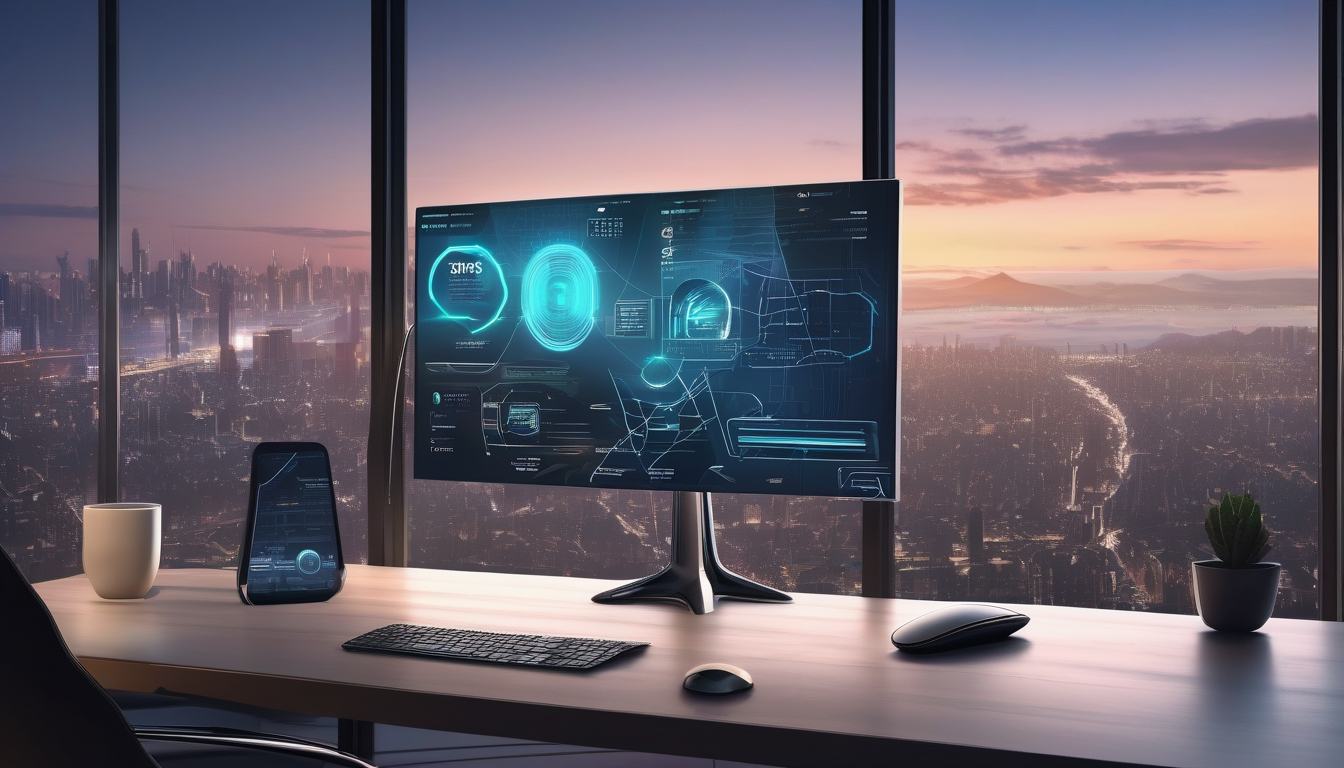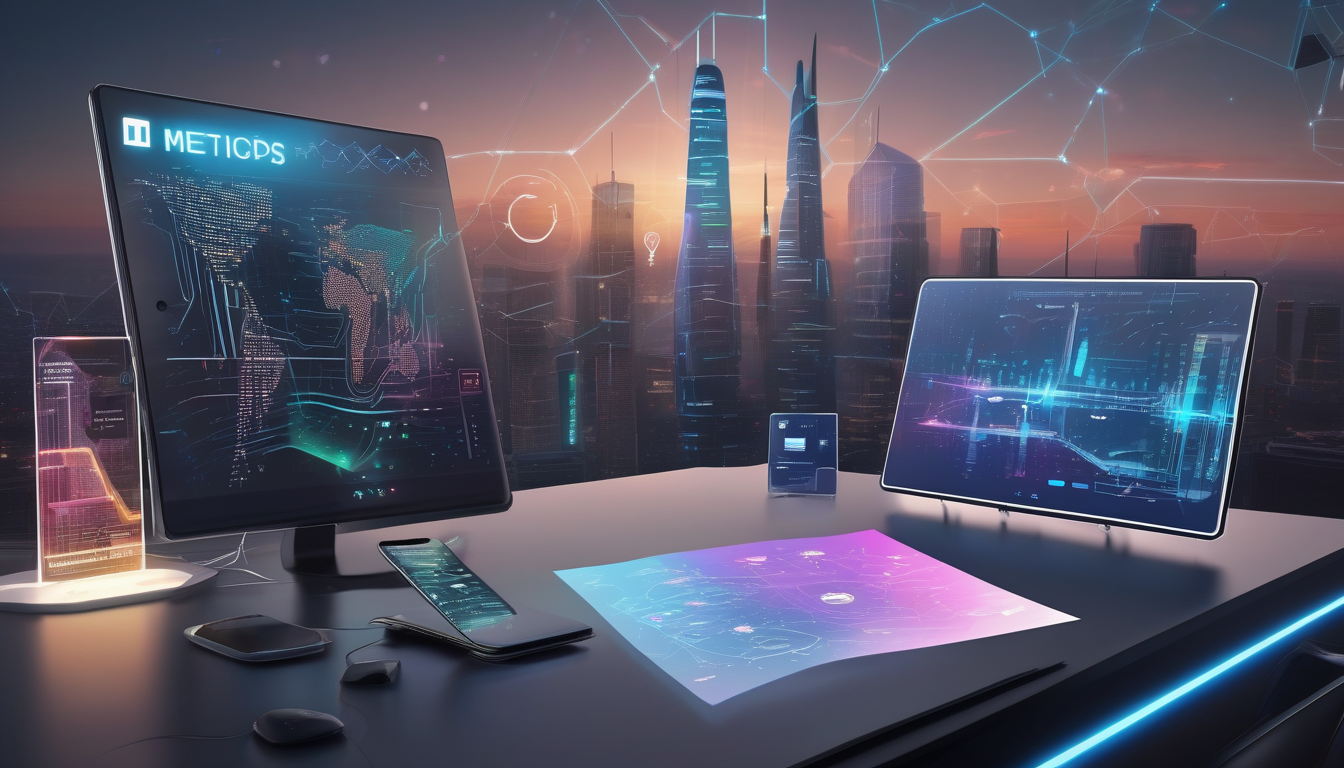The world of personal assistants is undergoing a remarkable transformation thanks to advancements in artificial intelligence (AI). Imagine waking up in the morning and having your personal assistant already prepare your schedule, remind you of important tasks, and even suggest the perfect breakfast based on your dietary preferences. Sounds like something out of a sci-fi movie, right? But this is the reality we’re stepping into, where AI isn’t just a tool—it’s becoming an integral part of our daily lives.
As we delve deeper into this fascinating topic, it’s crucial to understand that these AI-powered assistants are not merely voice-activated devices. They are evolving into intelligent companions that can learn from our behaviors and adapt to our needs. With recent breakthroughs in natural language processing and machine learning, these assistants can now engage in more meaningful conversations and provide responses that feel genuinely human. This level of interaction can significantly enhance user experience, making technology feel less like a machine and more like a friend.
Moreover, the integration of AI with smart home devices is revolutionizing the way we interact with our living spaces. Picture this: you walk into your home after a long day, and with a simple voice command, your lights dim, your favorite music plays, and the thermostat adjusts to your preferred temperature. This seamless control not only boosts convenience but also creates a cohesive living environment that can adapt to your lifestyle.
However, as we embrace these advancements, we must also be aware of the challenges that come with them. Issues such as privacy concerns and the potential for over-dependence on technology pose significant questions. Are we ready to trust AI with our personal information? And how do we maintain a balance between leveraging technology and preserving our critical thinking skills?
In conclusion, the future of personal assistants powered by AI is bright and full of possibilities. As we navigate this exciting landscape, it’s essential to stay informed and engaged with the technology that is set to redefine our daily lives.

Advancements in AI Technology
The world of AI technology is evolving at a breakneck pace, and the advancements in personal assistants are a testament to this rapid progress. Recent breakthroughs in voice recognition have made it possible for these assistants to understand and interpret human speech more accurately than ever before. Imagine having a conversation with your assistant that feels as natural as chatting with a friend! This leap in natural language processing means that personal assistants can now grasp not just the words you say, but also the context and emotion behind them, making interactions smoother and more intuitive.
Moreover, the incorporation of machine learning capabilities allows these assistants to learn from user interactions. This means that over time, your personal assistant becomes more attuned to your preferences, habits, and even your unique way of speaking. For instance, if you often remind your assistant to schedule your weekly meetings on Fridays, it will eventually preemptively suggest these meetings without you having to ask. This level of personalization transforms the assistant from a mere tool into a companion that enhances your daily life.
To illustrate the impact of these advancements, consider the following table showcasing key improvements in AI personal assistants:
| Advancement | Description |
|---|---|
| Voice Recognition | Enhanced accuracy in understanding various accents and languages. |
| Natural Language Processing | Ability to comprehend context and sentiment in conversations. |
| Machine Learning | Learning user preferences for more tailored interactions. |
In summary, the advancements in AI technology are not just incremental; they are revolutionary. With each leap forward, personal assistants are becoming more capable of enhancing our lives, making them indispensable tools for managing our increasingly busy schedules. Are you ready to embrace this future where your assistant knows you better than you know yourself?

Impact on Daily Life
AI personal assistants are revolutionizing the way we navigate our daily routines, making life not just easier but also more enjoyable. Imagine waking up in the morning and having your personal assistant remind you of your schedule while brewing your coffee. This is not just a futuristic dream; it’s happening now! With the ability to manage our calendars, set reminders, and even suggest optimal routes for travel, these digital helpers are becoming indispensable.
Moreover, AI personal assistants are enhancing productivity by streamlining tasks that once consumed valuable time. For instance, instead of manually searching for information, you can simply ask your assistant a question and receive immediate answers. This rapid access to information can significantly reduce stress and allow for a more organized lifestyle. Users across various demographics, from busy professionals to students, are finding that these tools help them reclaim their time and focus on what truly matters.
In addition to managing schedules, AI personal assistants are also integrating seamlessly with other technologies, such as smart home devices. This integration offers a cohesive living experience where you can control everything from your thermostat to your security system with just your voice. For example, you can say, “Hey Assistant, turn off the lights in the living room,” and voilà! Instant control without lifting a finger. This hands-free approach not only adds convenience but also enhances accessibility for individuals with mobility challenges.
Furthermore, AI assistants are contributing to energy management solutions in smart homes. They analyze usage patterns and provide users with insights to optimize energy consumption. This means not only saving money but also reducing environmental impact, making your home smarter and greener. Imagine receiving a notification that suggests the best time to run your dishwasher based on energy prices—this is the kind of intelligent support that AI brings to our everyday lives.
In essence, AI personal assistants are not just tools; they are companions that help us navigate the complexities of modern life, making us more productive and organized while providing a touch of magic to our daily routines.
Integration with Smart Home Devices
Imagine walking into your home after a long day, and with just a simple voice command, the lights dim, your favorite playlist starts playing, and the temperature adjusts to your liking. This is the magic of AI personal assistants seamlessly integrating with smart home devices. The synergy between these technologies is not just a luxury; it’s quickly becoming a necessity for modern living.
The integration of AI personal assistants with smart home technology offers a range of benefits that enhance convenience and efficiency. For instance, users can control lights, thermostats, and security systems all from a single interface. This level of connectivity creates a cohesive living environment where everything works in harmony. Think of it as having a personal butler who not only understands your needs but also anticipates them!
Moreover, the voice-controlled automation aspect of this integration is a game-changer. It allows users to manage home functions without lifting a finger, which is especially beneficial for those with mobility challenges or hectic schedules. Just picture cooking dinner while effortlessly adjusting the lighting or checking the weather—it’s like having a personal assistant right there with you.
Additionally, AI personal assistants can help optimize energy consumption in smart homes. By analyzing usage patterns, they provide insights and suggestions to reduce costs and minimize environmental impact. For instance, they can remind you to turn off lights in unoccupied rooms or suggest energy-efficient settings for your appliances. This not only saves money but also contributes to a greener planet.
In summary, the integration of AI personal assistants with smart home devices is revolutionizing the way we interact with our living spaces. It offers unprecedented convenience and efficiency, making our lives not just easier but also more enjoyable. As technology continues to evolve, we can only expect these integrations to become even more sophisticated, bringing us closer to the smart homes of our dreams.
Voice-Controlled Automation
Imagine walking into your home after a long day, and with just a simple command, the lights dim, your favorite music starts playing, and the thermostat adjusts to the perfect temperature. is revolutionizing the way we interact with our living spaces, making our homes not just smarter, but also more responsive to our needs.
With the rise of AI personal assistants, managing home functions has never been easier. You can control everything from your lighting and security systems to your kitchen appliances—all with your voice. This hands-free approach is especially beneficial for individuals with mobility challenges or those juggling a busy lifestyle. Just think about how much easier it is to ask your assistant to turn off the oven while you’re busy prepping dinner or to lock the front door when your hands are full of groceries!
Here are some key benefits of voice-controlled automation:
- Convenience: No more fumbling for switches or remotes; commands are just a voice away.
- Accessibility: Makes home management easier for seniors and those with disabilities.
- Efficiency: Streamlines daily tasks, allowing you to focus on what really matters.
Moreover, the integration of voice-controlled systems with smart home devices creates a cohesive ecosystem that enhances user experience. For instance, you can set up routines where saying “Goodnight” not only turns off the lights but also locks the doors and adjusts the thermostat for the night. This automation not only saves time but also adds a layer of security and comfort to your home.
As we continue to embrace this technology, it’s clear that voice-controlled automation is not just a trend; it’s the future of how we will live and interact with our environments. So, are you ready to let your voice do the talking?
Energy Management Solutions
In today’s world, where energy conservation is more crucial than ever, AI personal assistants are stepping up to the plate with innovative solutions that not only save money but also help protect our planet. Imagine having a personal assistant that not only reminds you of your appointments but also keeps an eye on your energy consumption. That’s the magic of AI! With advanced algorithms and real-time data analysis, these assistants can provide insights into how much energy you’re using and suggest ways to cut down on waste.
For instance, AI can analyze your daily routines and suggest optimal times for using high-energy appliances, like your washing machine or dishwasher. This not only helps in reducing energy bills but also contributes to a greener environment. Have you ever wondered how much energy your home uses at peak times? Well, AI can help you monitor that, providing you with a clearer picture of your consumption patterns.
Moreover, AI personal assistants can integrate with smart home devices to automate energy-saving measures. For example, they can automatically adjust your thermostat based on your schedule or even turn off lights in unoccupied rooms. This level of automation means you can enjoy a comfortable living space while being mindful of energy use.
Here’s a quick overview of how AI personal assistants contribute to energy management:
- Real-time monitoring: Track energy usage and identify trends.
- Automated controls: Manage devices based on your routines.
- Cost-saving recommendations: Receive tailored advice to reduce bills.
In essence, integrating AI into your home not only enhances convenience but also empowers you to make informed decisions about energy use. As we move towards a more sustainable future, these solutions will play a pivotal role in how we interact with energy in our daily lives.
Customization and Personalization
In today’s fast-paced world, AI personal assistants are not just tools; they’re becoming integral parts of our daily lives. One of the most exciting developments in this realm is the ability of these assistants to customize and personalize experiences based on individual user preferences. Imagine having a digital companion that knows your favorite coffee order, your preferred music genre, or even the best time to remind you about that important meeting. This level of personalization transforms mundane tasks into seamless interactions.
AI personal assistants utilize advanced algorithms and machine learning to analyze user behavior over time. They learn from your interactions, adapting to your habits and preferences. For instance, if you frequently ask for traffic updates at a specific time, the assistant will proactively provide this information without you needing to ask. This evolution is akin to having a personal assistant who not only follows your instructions but anticipates your needs. The more you interact, the smarter they become!
Furthermore, the customization aspect extends beyond simple preferences. Many AI assistants allow users to set custom commands or routines. For example, with a simple phrase, you can trigger a series of actions—turning on lights, adjusting the thermostat, and playing your morning playlist. This level of automation not only enhances convenience but also fosters a more intuitive user experience.
However, it’s essential to recognize that this personalization comes with a responsibility. As these assistants gather more data to enhance user experience, they must also prioritize user privacy. Ensuring that personal information is securely managed is crucial to maintaining trust. Users should feel confident that their preferences are used to improve their experience, not to compromise their privacy.
In summary, the customization and personalization capabilities of AI personal assistants are revolutionizing how we interact with technology. They are not just responding to commands; they are evolving into smart companions that enrich our daily lives, making tasks easier and more enjoyable.

Challenges and Limitations
As we delve deeper into the world of AI personal assistants, it’s essential to acknowledge the that accompany these technological marvels. While they have transformed our daily routines, they also raise significant concerns that cannot be overlooked. For instance, the issue of privacy is at the forefront. Personal assistants collect vast amounts of data about our habits, preferences, and even our conversations. This constant data collection can lead to a sense of unease among users, who may worry about how their information is being used or stored.
Moreover, the potential for data security breaches is a pressing concern. Cybersecurity threats are evolving, and as personal assistants become more integrated into our lives, the risk of unauthorized access to sensitive information increases. Users must be vigilant and informed about the security measures in place to protect their data. It’s a delicate balance between enjoying the convenience of AI and safeguarding personal information.
Another significant challenge is the growing dependence on technology. As these assistants become more capable and integral to our daily lives, there’s a risk that we may rely on them too heavily. This reliance can lead to a decline in critical thinking skills, as we may become accustomed to having answers at our fingertips without the need for deep thought or analysis. Additionally, it can impact interpersonal communication, as we might prefer interacting with our devices over engaging with people.
In conclusion, while AI personal assistants offer remarkable benefits, it’s crucial to remain aware of the challenges they present. Balancing the convenience of these technologies with the need for privacy, security, and healthy human interaction is vital for ensuring a positive experience. As we embrace the future, we must navigate these hurdles with care to harness the full potential of AI.
Privacy and Data Security Concerns
As we dive deeper into the world of AI personal assistants, one of the most pressing issues that emerges is privacy and data security. These digital companions are designed to make our lives easier, but they also collect vast amounts of data about us. Imagine having a friend who knows everything about your daily routines, preferences, and even your secrets. While this can be incredibly convenient, it also raises significant concerns about how that information is stored and used.
Firstly, the sheer volume of data collected can be staggering. From voice commands to smart home interactions, personal assistants gather insights that can paint a detailed picture of our lives. This information can be vulnerable to breaches, making it essential for companies to implement robust security measures. Users often wonder, what happens to my data? Is it sold to third parties? Is it protected against hackers? These questions highlight the necessity for transparency from tech companies.
Moreover, the risk of unauthorized access is a genuine concern. If a personal assistant is hacked, sensitive information could be exposed, leading to identity theft or other malicious activities. To mitigate these risks, here are some key practices that both users and developers should consider:
- Regular Software Updates: Keeping software up to date is crucial for security.
- Strong Passwords: Users should employ complex passwords and two-factor authentication.
- Data Minimization: Only sharing necessary information with AI assistants can limit exposure.
In conclusion, while AI personal assistants offer incredible advantages, we must remain vigilant about privacy and data security. As technology evolves, so too should our understanding and practices surrounding the protection of our personal information. After all, in a world where our data is the new currency, safeguarding it is not just wise; it’s essential.
Dependence on Technology
As we embrace the convenience of AI personal assistants, we must also consider the potential pitfalls of our growing dependence on technology. It’s like having a crutch; while it can help us walk better, relying on it too much can weaken our natural abilities. Have you ever found yourself unable to remember a simple fact because you always turn to your assistant for answers? This phenomenon raises important questions about how much we should lean on these digital helpers.
While AI personal assistants can streamline our daily tasks and enhance productivity, they can also lead to a decline in our critical thinking skills. Imagine a world where people forget how to navigate without GPS or rely solely on voice commands to perform basic functions. This dependency could hinder our ability to think independently and solve problems creatively. In a way, we might be trading our cognitive skills for convenience, and that’s a deal we need to think twice about.
Moreover, the reliance on AI can impact our interpersonal communication. Picture a family dinner where everyone is glued to their devices, asking their assistants questions instead of engaging in conversation. This shift not only affects our relationships but also diminishes our ability to connect with others on a deeper level. The art of conversation could become a lost skill, overshadowed by the ease of asking a machine for information.
In light of these concerns, it’s crucial to find a balance between utilizing AI personal assistants and maintaining our human skills. Setting boundaries, such as limiting the use of these technologies in social settings or during critical thinking exercises, can help us retain our cognitive abilities. After all, technology should enhance our lives, not replace the fundamental skills that make us human.
Frequently Asked Questions
- What are AI personal assistants?
AI personal assistants are software applications that use artificial intelligence to perform tasks or services for individuals. They can help manage schedules, answer questions, and control smart home devices, making everyday life more convenient.
- How do AI personal assistants improve productivity?
By automating routine tasks and providing quick access to information, AI personal assistants help users save time and stay organized. They can schedule appointments, send reminders, and even suggest the best times for tasks, allowing users to focus on what truly matters.
- Are there privacy concerns with using AI personal assistants?
Yes, privacy is a significant concern. AI personal assistants collect and process personal data to provide tailored experiences. It’s crucial for users to understand how their data is used and to take steps to protect their privacy, such as adjusting settings and reviewing permissions.
- Can AI personal assistants integrate with smart home devices?
Absolutely! Many AI personal assistants can seamlessly connect with smart home devices, enabling users to control lighting, temperature, and security systems with simple voice commands, enhancing convenience and efficiency in daily life.
- What challenges do AI personal assistants face?
AI personal assistants face challenges like ensuring data security, addressing user privacy concerns, and overcoming limitations in understanding complex queries. Continuous improvements are necessary to meet user expectations and technological advancements.



